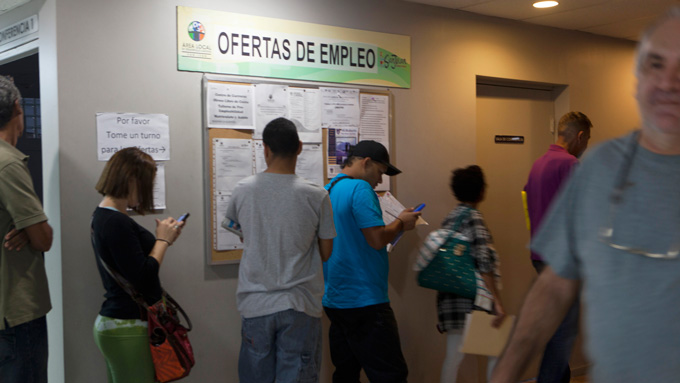Every once in a while it seems that Puerto Rico's government decides to fix the economic problems it has caused by –unofficially– pushing the population to leave the country. And now that it has dragged the island into a decade-long recession, irresponsibly accumulated $72 billion in debt, hiked utility rates while cutting service, and imposed excessively high taxes on consumer products, among other things, hundreds of thousands of Puerto Rican families are again packing their bags in hope of finding a new, prosperous home in the US.
It's as if the government doesn't realize that in capitalist economy, cutting already downtrodden consumers' disposable income is a surefire way to create a permanent recession.
In fact, according to the Pew Research Center, "Puerto Ricans have left the financially troubled island for the US mainland this decade in their largest numbers since the Great Migration after World War II, citing job-related reasons above all others."

Looking for a job in Puerto Rico? Well, Walmart might have a minimum wage job for you!
There is a difference between the Great Migration of the 1950s and that of today. The Great Migration happened at a time when the Puerto Rican government was transforming the economy from an agrarian to an industrial one. The theory at the time was that an agrarian economy was not sufficient to support the growing population. But while the transformation did improve Puerto Rico's economy, thousands of Puerto Ricans who were not absorbed by it, mostly unskilled workers from rural areas, were indirectly encouraged to move to the States.
Today's migration, meanwhile, is the result of the government not having found an adequate replacement to the now expired corporate tax incentives that attracted many skilled, industrial jobs to the island. Those incentives were replaced with new incentives that ended up attracting mostly low paying jobs that offer no benefits, forcing the people who took those jobs to have to also seek government assistance to make a living. To wit, minimum-wage employer Walmart is Puerto Rico's largest private sector employer.
While the new northbound migration includes both unskilled and skilled workers, it is resulting in a brain drain that has never before been seen in Puerto Rico. In a nutshell, the government is scaring away the people who are most needed to get the economy back on track.
In a 2013 interview with Caribbean Business, Puerto Rico's only business-focused newspaper, Terrence Ryan, the president of headhunting firm Ryan Executive Search & Outplacement, said "We have lost 20,000 professionals in the past three years, physicians, architects, engineers, professionals at all levels. Gone. I had to open an office in Florida because there are some professional positions for which I have to search among [Puerto Rico] residents who left for the U.S." Among the jobs Ryan has filled from Florida include environmental lawyers, ceramic engineers, accountants and banking professionals.
For many years the Puerto Rican government has gone on and on about creating a "knowledge economy" but all it has done is run the country to the ground, forcing a large part of its skilled labor to move out. How does the government expect a smaller, less skilled population to pay off its debt?

Comments